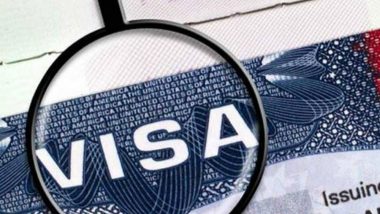Washington, May 30: More than 5,000 complaints of H-1b visa fraud and abuse have been received by a federal agency on a dedicated email helpline that was launched by the Trump administration last year, an official said.
"As of May 21, 2018, the USCIS has received over 5,000 tips to the dedicated H-1B email address," Philip Smith, a Spokesperson for the US Citizenship and Immigration Services (USCIS) told PTI.
After US President Donald Trump Signed "Buy American, Hire American" executive order last year, Fraud Detection and National Security Directorate (FDNS) established email addresses dedicated to receiving information about suspected H-1B and H-2B fraud or abuse.
FDNS leads USCIS's efforts to combat immigration benefit fraud. Anyone (including both American workers and workers who suspect they or others may be the victim of H-1B or H-2B fraud or abuse) can email ReportH1BAbuse@uscis.dhs.gov or ReportH2BAbuse@uscis.dhs.gov to submit tips, alleged violations, and other relevant information about potential fraud or abuse, Smith said.
The USCIS, however, did not provide any other details with regard to the nature of complaints, the companies involved and which country's high-tech professionals were the victims of H-1B visa fraud and abuse.
"Pursuant to the Buy American, Hire American Executive Order, FDNS has helped the agency investigate the H-1B program to protect American workers," Smith said.
In April 2017, USCIS FDNS created and implemented the Targeted Site Visit and Verification Program (TSVVP) as part of its continuous efforts to enhance the integrity of the immigration benefits process, he said.
"This targeted approach focuses on H-1B dependent employers (those who have a high ratio of H-1B workers as compared to US workers, as defined by statute); Cases that we cannot validate the employer's basic business information through commercially available data; and employers petitioning for H-1B workers who work off-site at another company or organization's location," Smith said in response to a question.
FDNS officers resolve background check information and other concerns that surface during the processing of immigration benefit applications and petitions.
Resolution often requires communication with law enforcement or intelligence agencies to make sure that the information is relevant to the applicant or petitioner at hand and, if so, whether the information would have an impact on eligibility for the benefit.
FDNS officers also perform checks of USCIS databases and public information, as well as other administrative inquiries, to verify information provided on, and in support of, applications and petitions.
Smith said administrative inquiries may include targeted site visits – Inquiries conducted in cases where fraud is suspected. FDNS uses the Fraud Detection and National Security Data System (FDNS-DS) to identify fraud and track potential patterns, he said.
The USCIS has formed a partnership with Immigration and Customs Enforcement (ICE), in which FDNS pursues administrative inquiries into the most application and petition fraud, while ICE conducts criminal investigations into major fraud conspiracies, he said.
According to the USCIS, the H-1B visa program should help US companies recruit highly-skilled foreign nationals when there is a shortage of qualified workers in the country.
"Yet, too many American workers who are as qualified, willing, and deserving to work in these fields have been ignored or unfairly disadvantaged," the USCIS says on its webpage.
Employers who abuse H-1B visa program may negatively affect US workers, decreasing wages and opportunities as they import more workers from abroad, it said.
Highly popular among Indian technology professional, the H-1B visa is normally issued for three years and renewed for another three years. The US Congress has a cap of 65,000 H-1B visas per year. It also issues another 20,000 H-1B visas to those who have masters and higher education from a US academic institute.
(The above story is verified and authored by Press Trust of India (PTI) staff. PTI, India’s premier news agency, employs more than 400 journalists and 500 stringers to cover almost every district and small town in India.. The views appearing in the above post do not reflect the opinions of LatestLY)













 Quickly
Quickly


